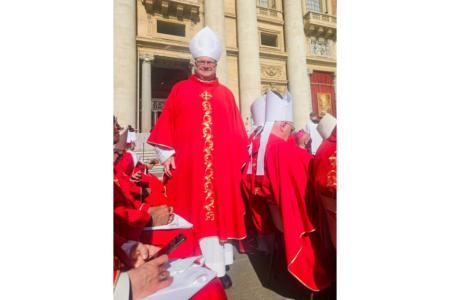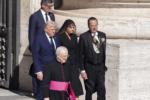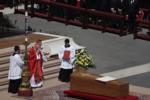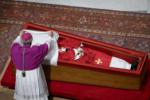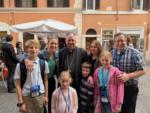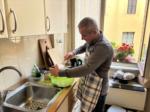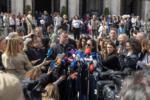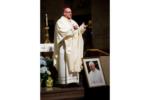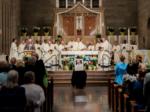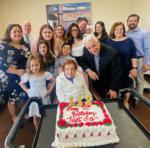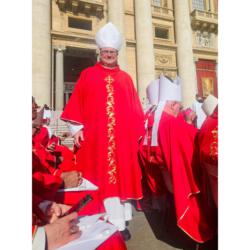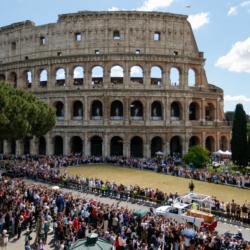Pope spent pontificate going to peripheries; at funeral, they came to him
VATICAN CITY (CNS) -- When Pope Francis was elected as the first Latin American pontiff, he said his brother cardinals went out of their way to pick someone from the "ends of the earth."
He spent the rest of his pontificate going back out to those peripheries, traveling to more than 65 nations, preferring those that were poor, scarred by war, marginalized and forgotten. Then the peripheries came to him on the day of his funeral in St. Peter's Square.
More than 160 nations sent delegations April 26, headed by kings and queens, presidents and prime ministers, government officials and ambassadors.
Several nations were geographically far-flung like the South Pacific archipelago of Vanuatu, New Zealand, Australia and Japan.
Many were nations on the fringes of the world's attention, but where the pope never visited like Albania, Iceland, El Salvador, Angola, Gabon, Burundi, Sierra Leone, Togo, Zimbabwe, Equatorial Guinea, Eswatini, Qatar, Oman and Vietnam.
All the countries the pope visited in his 12-year pontificate were represented except Kazakhstan and South Korea, according to the list of confirmed delegations the Vatican press office released late April 25.
The nations on the peripheries the pope visited that came to Rome to return the honor included: Timor-Leste, Cuba, Madagascar, Central African Republic, Congo, South Sudan, Kenya, Mozambique, Morocco, Mongolia, Indonesia, Papua New Guinea, Myanmar, the Philippines, United Arab Emirates, Bahrain, Palestine and many others.
But of course, political elites and nations at the center of power were present, too: U.S. President Donald J. Trump and his wife Melania, French President Emmanuel Macron, Argentine President Javier Milei, Italian President Sergio Mattarella, Italian Prime Minister Giorgia Meloni, British Prime Minister Keir Starmer, U.N. Secretary-General António Guterres, King Abdullah II of Jordan, Britain's Prince William and Mary Simon, the governor-general of Canada.
Delegations also were present from Saudi Arabia, Iraq, Iran, Syria and Sudan. However, Taiwan, not mainland China, was represented by Chen Chien-jen who served as vice president and premier of Taiwan. Only a dozen countries, including Vatican City State, officially recognize Taiwan as an independent sovereign state while China maintains its claim over the island.
Vatican protocol for a papal funeral places cardinals, bishops and ecumenical delegates to the left of the casket and heads of state to the right.
Of the nearly 40 ecumenical delegates, there were Orthodox Ecumenical Patriarch Bartholomew of Constantinople; Russian Orthodox Metropolitan Anthony of Volokolamsk, head of external church relations for the Moscow Patriarchate; Catholicos Karekin II, the patriarch of the Armenian Apostolic Church; as well as representatives of the Anglican, Lutheran, Methodist and Evangelical communities.
Protocol also determines the seating arrangements within the VIP section for political leaders. The large delegations from Italy and Argentina, the pope's home country, were in the front row, followed by royalty, then international leaders in order of political hierarchy and in alphabetical order of their country's name in French.
That meant U.S. President Trump was nowhere near Ukraine's President Volodymyr Zelenskyy. Representing "États-Unis," Trump was invited to sit near Estonia, Finland and France.
However, world leaders had a chance to pray at the pope's closed casket in the basilica before the funeral started. Zelenskyy and Trump sat down briefly for a "very productive" talk, according to the White House. Zelenskyy said on Telegram it was a "good meeting. One-on-one, we managed to discuss a lot. We hope for a result from all the things that were said."
The "very symbolic meeting," he said, "has the potential to become historic if we achieve joint results. Thank you, President Donald Trump!" A photo of Zelenskyy, Trump, Macron and Starmer meeting and speaking together in the basilica was also published on social media.
Nonetheless, the complex seating arrangements for the funeral meant many traditional enemies and nations at war were not seated near each other.
For example, Zelenskyy, who is a head of state, was seated ahead of Russia's representative, Olga Lyubimova, who is the minister of culture.
Palestinian Prime Minister Mohamed Mustafa was also seated far from Israel's ambassador to the Vatican, Yaron Sideman, who attended even though official representatives of Israel are normally prohibited from participating in formal activities on the Jewish Sabbath.
"In this case, an exception was granted because of its importance," Sideman told Ansa, the Italian wire service, April 24. "Israel attaches great importance to expressing its condolences and joining the Catholic world in mourning the passing of the pontiff."
Even though alphabetically close, Armenia and Azerbaijan, who are locked in an ethnic and territorial conflict over the region of Nagorno-Karabakh, were seated far apart since Armenia sent its president and Azerbaijan sent the speaker of its national assembly.
Because he is not an active head of state, former U.S. President Joe Biden, a Catholic, was seated in a separate VIP section and not near Trump, who has repeatedly vilified him publicly.
In another section, numerous representatives of other religions were present such as Buddhists, Hindus, Jains, Zoroastrians, Sikhs, Muslims and Rabbi Riccardo Di Segni, the chief rabbi of Rome.
The presence of so many world leaders at Pope Francis' funeral and their praise and accolades after his death April 21 sparked accusations of hypocrisy, especially in Italy, where the government has taken a hard line against immigration.
Achille Occhetto, an Italian politician, said, "Now that Francis is dead, all the floggers of migrants, champions against welcoming, in short, all shades of bullies and authoritarians in the world, pretend to bow to him."
Cardinal Domenico Battaglia of Naples told the Italian daily, La Repubblica, April 26, "There is a risk of beatifying him in words, only to forget him in deeds."
Pope Francis "spoke plainly" without mincing words as all prophets do, he said. The cardinal compared the situation to King Herod and John the Baptist. Herod "welcomed him, listened to him and then did the opposite of what John preached."
The pope's funeral provided a rare opportunity for enemies and friends to come together as one and be reminded of his invitation to "build bridges and not walls." But he also warned that the world needed action and not words.
